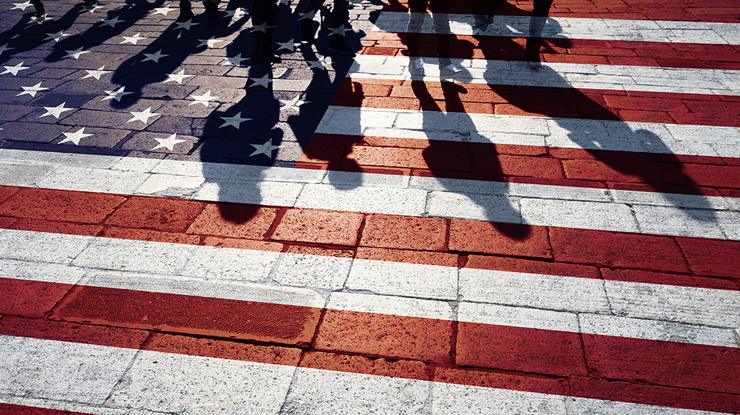"The United States is a nation of contrasts."
Paul Scarcia-Scheel, a lawyer who was born in the United States but grew up mostly in Germany, has fulfilled a long-held dream of starting his own law firm in Manhattan, New York. In an interview, he talks about his experiences of living in both the Black Forest and Manhattan, explores what home means to him, and shares his insights on the challenges of navigating two different realities. He also discusses the industries that offer good opportunities for expatriates who want to obtain a residency permit
You started your law firm in New York in 2022, but you grew up mostly in Germany. How would you describe yourself as someone who has both German and American influences?
Scarcia-Scheel: I was born in New Jersey, USA, to a German mother and an Italian-American father. Initially, my mother came to the US as an au pair with no plans to stay permanently. However, things changed when she met and married my father. I spent the first five years of my life in New Jersey. After my parents separated, my mother and I moved to Germany and settled in a small town near Karlsruhe, at the foot of the Black Forest. During that time, I attended an American kindergarten located on a US military base in Karlsruhe, when American troops were still stationed in Germany. From then on, I mainly grew up in Germany.
Because I spent my childhood and teenage years in Germany, that's where I received most of my cultural and social upbringing. As a result, I feel more connected to German culture than I do to American culture. At first, I encountered some cultural misunderstandings in the United States, and it can still something that can happen today.
What cultural misunderstandings have you encountered for example?
Scarcia-Scheel: Germans, like myself, are known for being more straightforward in their communication compared to Americans. When we say "no," we say it directly without using unnecessary words. However, in the United States, it is generally considered impolite to address problems directly. I've heard of German expatriates whose directness has affected their careers negatively.
In professional settings, I've learned to use the "sandwich technique" commonly used in America when giving feedback. This approach involves starting with a positive comment, then addressing the areas that need improvement, and finally ending on a positive note. It's about providing constructive criticism in a balanced way. For instance, I might say, "I appreciate your efforts so far, and I believe you can make adjustments and improve."
Additionally, I have sometimes misunderstood the friendly demeanor of Americans. As a German, it can be difficult for me to perceive the underlying messages or hidden meanings. There have been times when I mistakenly believed that a metaphorical door was still open when, in fact, it was already closed.
Furthermore, I might appear somewhat reserved to Americans. While Americans are generous with compliments, I often feel uneasy with excessive praise, which makes me less inclined to engage in that type of benevolent communication.
"Americans are generous with compliments."
One significant difference that I consistently notice is the fact that Americans tend to act first and think later - they have a "hands-on" approach. In my case, it's the opposite, where I tend to think first before acting. This has been perceived as a weakness because it can come across as hesitant or indecisive.
Did you visit your father in the USA regularly during your childhood?
Scarcia-Scheel: Yes, I visited my father, who had remarried an American woman, for the first time during summer vacation when I was 12 years old. I arrived at LaGuardia Airport in Queens, New York and then flew by helicopter over Manhattan to the small airport in Newark, New Jersey, where my father picked me up. It was during that helicopter ride over Manhattan, witnessing its impressive skyline and streets, that I fell in love with the city. From that moment on, as a young boy, I had a lifelong dream - to live in New York! I believe my mother arranged the helicopter flight to make me happy. Of course, there were more ordinary ways to travel from Queens to New Jersey
After that experience, I started spending my summer vacations and college breaks with my father in the USA. During those visits, I had the opportunity to explore New York extensively, not just the popular tourist spots but also the lesser-known areas.
My father worked as a landscaper, where he would design and take care of people's properties in New Jersey. Sometimes, he would bring me along with him, allowing me to get a glimpse into the lives and lifestyles of the homeowners he worked for.
"The little 12-year-old boy now had a lifelong dream, which was to live in New York!"
What specifically sparked your fascination with New York?
Scarcia-Scheel: It was the towering skyscrapers and the vibrant melting pot of cultures. Seeing the diverse mix of people from different backgrounds in one dynamic city was incredibly captivating. My father, although born in the USA, has Italian roots, so exploring the multicultural tapestry of New York and witnessing the myriad influences brought by people of various origins was truly fascinating.
How has your background and your parents' cross-cultural relationship influenced your perspective on the world? And in light of this, what does the concept of home and heritage mean to you personally?
Scarcia-Scheel: I learned to recognize and appreciate contrasts at a young age. Growing up in a rural village in the Black Forest, where my grandparents had a trout farm, provided me with a grounded upbringing. However, through my visits to the USA and the experiences shared with my father, I was exposed to a completely different and vibrant urban environment. This upbringing in two distinct worlds has shaped my worldview and taught me to embrace diversity. Home and heritage, for me personally, encompass a fusion of cultures and a deep appreciation for the interconnectedness of different backgrounds.
 Manhattan, New York, USA © Oleg Zhukov AdobeStock
Manhattan, New York, USA © Oleg Zhukov AdobeStock
"I learned early on that lifestyles and life choices are not taken for granted."
I have learned that lifestyles and life choices are not to be taken for granted and, above all, they are diverse. Additionally, my ability to switch between these worlds has made me less bound to a specific location.
At the moment, I don't have a definitive sense of home. Whether I will stay in the USA for the rest of my life is uncertain at this point. It might even evolve into a hybrid model. I have been living a life in two parallel worlds for such a long time now.
What exactly do you mean by that?
Scarcia-Scheel: The internet has brought about significant changes. I can sit on a park bench in New York and read real-time news from Germany. I can follow German football from Manhattan and stay in touch with friends and acquaintances in Germany, despite the distance of the Atlantic Ocean. I now perceive these two parallel worlds as completely normal.
As a result, the concept of emigration has a different meaning compared to, let's say, 40 years ago. In the past, those who emigrated often had to sever ties with their homeland. For example, I have encountered German immigrants who had lived in the USA for a long time and would frequently mix German sentences with English terms. With the advent of the internet, the transition to a new country and culture is no longer as definitive as it used to be, as one can maintain a connection to their old homeland.
Growing up between these two worlds was both a blessing and a curse. I enjoyed the advantages and was privileged to be able to fly to the USA twice a year as a young person to spend time with my father. This allowed me to become familiar with different mentalities at an early age.
The downside was that my father was not consistently present, and there were times when I never truly felt like I belonged. This feeling persists to this day. In Germany, I sometimes get weighed down by the typical German tendency towards grumpiness or dissatisfaction, and I miss the American pragmatism and optimism. On the other hand, in the USA, I sometimes miss the rich history of architecture and the convenience of short distances that exist in Europe. Within an hour's drive, one can reach another country.
After my mother's passing, I no longer have close relatives in Germany. My father is my closest relative, and I have a desire to spend more time with him. There is still family in Rome, and a large Italian community resides in New Jersey as well.
So, if I understand correctly, you had been working as a lawyer in the USA for several years before finally realizing your dream of establishing your own law firm in New York in 2022?
Scarcia-Scheel: That's correct. Before starting my own firm, I gained valuable legal experience in the United States, particularly in Manhattan, where I worked at a specialized law firm focusing on German-American legal matters. However, personal circumstances led me to temporarily return to Germany to be with my ailing mother. After her passing, I decided to return to the USA and fulfill my long-held dream of establishing my own law firm in the vibrant city of New York. In 2022, I founded the Scarcia-Scheel Law Firm P.C. and began practicing as an attorney in Manhattan.
You have acquired a specialised expertise in German, US-American, and even Australian law, which is quite impressive. Could you provide more details about your professional activities?
Scarcia-Scheel: Initially, my study of Australian law wasn't planned; it was a result of personal circumstances related to my love life. However, studying Australian law turned out to be beneficial as it falls within the Common Law legal system, similar to the US. This background in Australian law now enhances my work as an attorney in the USA. Common Law relies on precedent-setting court decisions, while German law, belonging to the Civil Law tradition, focuses on detailed codification derived from Roman law.
In my law firm, I primarily focus on advising clients from German-speaking countries on German-American legal matters. Additionally, I often represent US clients involved in legal disputes in Germany, serving as a crucial link between the two legal systems with their distinct approaches to litigation.
One example of my current work involves representing a New York-based doctor who is facing a lawsuit in Germany for breaching a licensing agreement. In this case, I serve as the intermediary between the German and American legal teams.
Another significant area of my practice is providing guidance on employment and investment-based US visa law. It's both professionally and personally rewarding to assist individuals in realizing their American dreams.
Overall, my diverse expertise allows me to navigate the complexities of different legal systems and bridge the gap between clients from different backgrounds and jurisdictions.
 © promesaartstudio AdobeStock
© promesaartstudio AdobeStock
"As a German-American attorney, I serve as a bridge between two distinct legal systems where processes and legal disputes are handled quite differently."
According to recent surveys, many German companies are once again interested in investing in the United States (and potentially less in China). Which industries have good opportunities to successfully deploy skilled personnel?
Scarcia-Scheel: In January 2023, the Inflation Reduction Act came into effect. It aims to invest $370 billion in the next ten years in energy transition and climate protection. This includes the modernization of the national power grid, the expansion of environmentally friendly infrastructure, particularly in public transportation, the development of technologies for sustainable energy and emission reduction. Companies with expertise in this field have good opportunities to invest in the USA. Specifically, industries specialising in renewable energies such as hydrogen, solar, or wind energy would be relevant examples.
"The United States has been and continues to be a country of immigration."
Other promising opportunities exist for companies in the field of electromobility, specifically in electric vehicles, as well as in the rail transportation sector. Additionally, companies involved in battery production for electric cars have good prospects. The IT industry continues to have a significant demand for skilled professionals, and the life sciences sector, encompassing digital health, MedTech, digital health applications, and medical technology, holds great importance as well.
It is often said that the USA is very protectionist. How do you perceive this?
Scarcia-Scheel: I wouldn't describe it as being highly protectionist. The process of obtaining a residence permit has always had specific requirements. However, the United States has consistently shown interest in welcoming individuals who can contribute to society. Those individuals and companies that are sought after in the country have favorable opportunities to establish themselves. Since the containment of the COVID-19 pandemic, I have noticed a significant increase in inquiries for residence permits, including from German companies. Factors such as rising energy prices in Germany have driven companies to consider increasing their production in the USA. The USA has a long history as a traditional immigration country and has always had an open attitude towards immigrants.
Under what conditions can private individuals from Germany obtain a residence permit and what are the current chances of obtaining a residence title?
Scarcia-Scheel: The immigration law in the United States is highly codified. This means that immigration laws and regulations are documented in a systematic and comprehensive manner, consolidated and organized in the Immigration and Nationality Act (INA).
For foreign individuals, there are essentially four ways to obtain a residence permit:
The first option is family reunification, where one must demonstrate being a qualifying family member of a U.S. citizen or a lawful permanent resident (green card holder). Qualifying relationships may include spouses, unmarried children under 21 years old, or parents of U.S. citizens. The closer the familial relationship, the greater the chance of obtaining a residence permit and the faster it can be obtained. More distant family members often face lengthy waiting periods.
The second option is through employment, where one has a job offer from a U.S. employer. In some exceptional cases, a job offer may be waived if there is a significant national interest or if the individual possesses extraordinary qualifications for a specific occupation.
The third avenue for immigration is through investment, and the chances increase with the amount of money one brings and is willing to invest. As a guideline, a minimum of $100,000 is often considered.
Lastly, the fourth opportunity is the Diversity Visa Lottery, also known as the Green Card Lottery, which randomly awards 55,000 green cards worldwide each year, with 3,500 allocated to Germany.
 © robsonphoto, AdobeStock
© robsonphoto, AdobeStock
In Germany, the USA is perceived as very divided - in some cases even backward. This applies to the judicial system, the electoral system and also the right to bear arms. At the same time, the currently most important technical and especially digital innovations still come from the USA. Is the Germans' perception correct or distorted?
Scarcia-Scheel: The perception of the United States by Germans as being highly divided and, at times, backward is neither entirely accurate nor distorted. The USA is a country of contrasts, where significant disparities exist. On one hand, it showcases incredible progressiveness, while on the other hand, there are areas that can be considered relatively backward, particularly in rural regions that seem to transport you back in time. However, it's important to note that there are also cutting-edge and forward-thinking cities like New York that demonstrate the country's modernity. Furthermore, the stark contrast between wealth and poverty is another manifestation of these disparities within the nation.
"Perhaps we Germans feel closer to Americans than we actually are."
As for the question of whether the US is more advanced or more backward, I can only answer as a layman. It may not be the undisputed economic powerhouse it was 40 years ago, with China catching up, but the US is still at the forefront. Many technological innovations still come from the US.
As far as guns are concerned, the reasoning of many Americans is quite unique: they believe that you wouldn't try to rob a restaurant if there were armed people there.
It is possible that we Germans feel closer to Americans than we actually are. But the cultural differences between Germany and the US are considerable. We must also remember that the USA has not been around as long as Germany. Think of it this way: the US is a 25-year-old who wants to experience more, build a career and take risks, while Germany is a more experienced 55-year-old who approaches things with deliberation and rationality. In short, the preferences and approaches are different.
What advice would you give to individuals who are drawn to the USA and want to settle there?
Scarcia-Scheel: One of the most important things is to have financial reserves because the cost of living in the USA is high. Especially in urban areas, everything feels at least three times more expensive than in Germany, particularly in Manhattan.
I would also advise not to misunderstand or overestimate American friendliness. Typically, people are not interested in deep friendships, so one should not misinterpret personal interest. It's important not to appear too authentic, not to be too direct, or share too much about one's personal life. If you want to express criticism, it's best to phrase it in a more indirect way.
It's also crucial to be aware that the work environment is completely different from Germany. The working conditions are less employee-friendly. The "hire and fire" mentality prevails, meaning there is no strong job security or extensive protection against termination. Vacation days are limited, and even paid vacation must be negotiated. Rights such as guaranteed lunch breaks are not as prevalent as in Germany.
There are also different societal customs, especially regarding consumerism, which may be contrary to the preferences of Germans. For example, it's important to build a credit history by financing things on credit. This is because to obtain a loan for a house, one needs a creditworthiness that is established by making purchases on credit.
Many people are also unaware of the significant role of tipping. To navigate everyday service situations successfully, it is customary to give at least 10 to 20 percent tip, regardless of the bill amount.
Finally, unless you live in the heart of a major city, owning a car is essential because public transportation options are not as extensive as in Europe.
 © eyetronic, AdobeStock
© eyetronic, AdobeStock
"If you want to live permanently in the USA, it is advisable to build a credit history."
Despite these differences, which Germans might perceive as disadvantageous, I have the impression that Americans handle everyday life much better than Germans. They are more relaxed and friendly in their approach. On the other hand, Germans often make life difficult for themselves and unnecessarily hinder each other's progress.
However, Germans are also much deeper in their emotions, and friendships can last a lifetime. In the USA, relationships may not reach the same level of depth, as people there tend to be more individualistic.

